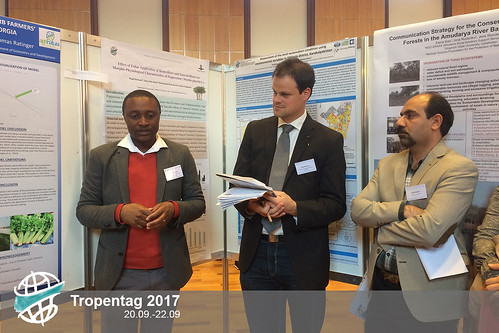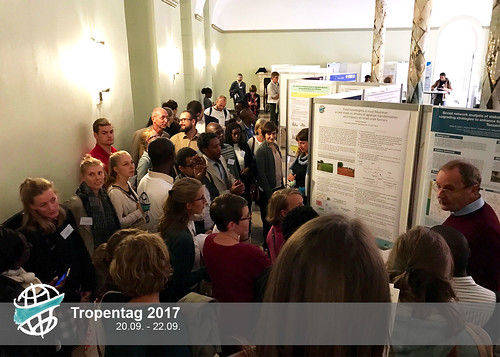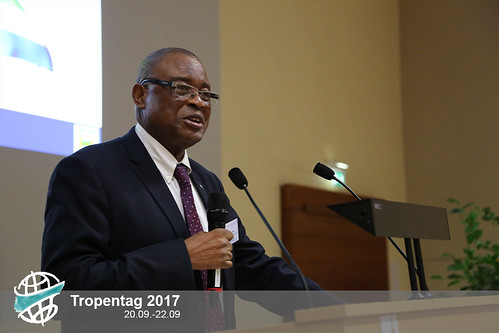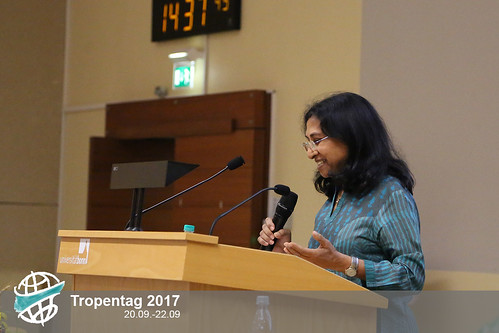Blogs
Young Scientists Win Award for Fight Against Hunger
Wed, 09/20/2017 - 19:53 — giulia.rotanodari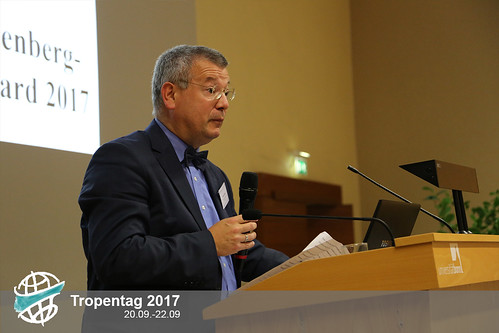 “Genome based identification of heterotic pattern in rice”, Ulrike Beukert, University of Martin-Luther-University of Halle-Wittenberg
“Genome based identification of heterotic pattern in rice”, Ulrike Beukert, University of Martin-Luther-University of Halle-Wittenberg
Rice is one of the most important staple crops in the world. A lot of research has been conducted, but more investigations are needed in order to optimize land use by maximizing yield. Ulrike Beukert, a MSc. student at the University of Martin-Luther-University of Halle-Wittenberg, conducted an investigation on boosting yield by exploiting heterosis in rice. Results show that heterosis provides enhanced yield stability and increased abiotic and biotic stress resistance.

New strategies and models in Central Asia
Wed, 09/20/2017 - 19:47 — Hana KhanhEven though the first poster session of Tropentag 2017 began late in the afternoon in the AULA, the audience was still excited and enthusiastic for the 11 presentations on Central Asia. Honestly, one hour and a half is not enough time for all the researchers to present their work in the depth their passion showed they deserved.
And that was exactly the case for Welcome Zimuto from the Czech university of Life Sciences. He brought to the session a poster describing his work on modeling alternative profit maximisation and crop-land allocation strategies for two cooperative herb farms in Georgia. Although the limitation of the model he used was when the price of inputs fluctuates, his results are applicable and should interest further development.
Meanwhile, Elena Kan presented her research on communication strategies for preservation of the flood-plain forest in the Amudarya River Basin in Uzberkistan. Her efforts to work with a variety of different stake holders for her research was both interesting and valuable.
Late start. Inaudible. THE NEW DIRECTION OF AG!
Wed, 09/20/2017 - 19:42 — megreslerOne audible theme carried across the session: a need for distinctly long-term thinking when seeking solutions for food system transformation. Despite the challenging circumstances, the fourteen presenters of Poster Session 1 "Institutions and Livelihoods" on Wednesday afternoon brought innovative research into discussions of gender and rural sociology.
From whether childhood experiences influenced the decision to migrate or not from rural areas in Ethiopia, to considerations of gender and social hierarchy in forward-looking decisions within Tanzanian vegetable production, these posters were representative of the direction future agricultural research is moving in.
While not complaining about the additional 60 seconds added to her presentation time due to the late-start and missing presenters, Mst. Tania Parvin from the University of Hohenheim explained, "I think next time we should start on time... the last person might be presenting in front of no audience."Speaking from an air of frustration with the volume of the presentations Parvin's colleague Mary added the suggestion, "Maybe next time they should provide a mic?"
Soil Matter(s) - More Attention Please!
Wed, 09/20/2017 - 19:42 — schumacherlydiaIn the AULA, the poster session started with only a handful of patient Tropentag participants as the plenary session dragged on without end. After a few posters were presented, it got more and more crowded, to the point that standing two meters away from the speaker made it impossible to hear, much less understand. Conversations among the gaggle watching made it even harder. Camera and t-shirt made it clear I was there on business, and people made way so I could capture the the main content.
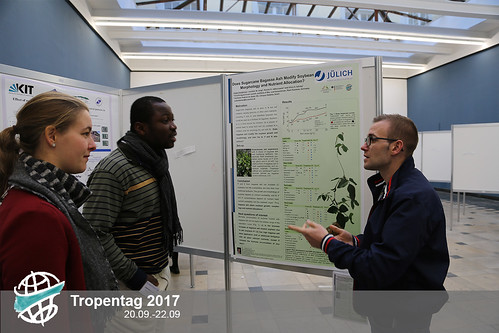
Based on the presented posters during the first session, soil and its components (it's a 4-dimensional object!) play a vital role in sustainable food production and therefore our future. The young researchers tried to find ways to use the many qualities of soil. Vitalij from the Juelich Institute had researched the effects of recycling sugarcane bagasse, a byproduct of industrial processing, when applied in soybean cultivation to increase nutrient availability and uptake.
Young scientist fights hunger
Wed, 09/20/2017 - 18:57 — mustamin.fadliThe Hans Hartwig Ruthenberg Graduate Award is usually given to promising young scientists working towards improving farming systems and alleviating hunger. This year Ulrike and Sarah were honored.
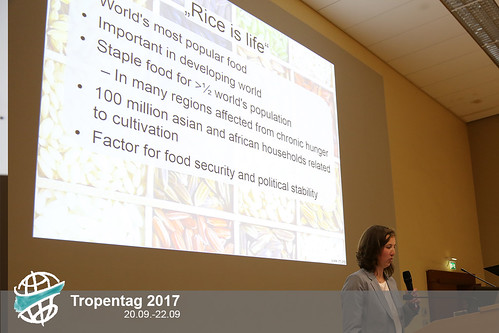
Ulrike Beukert
How will we meet the rising demand of rice in future owing to the growing population? For a long time, plant breeding has been the popular answer to this question. However in most cases, the yield remains stagnant. The high expense incurred by the current current approach is a huge challenge. Ulrike Beukert, Plant Breeding student from Martin-Luther-University of Halle-Wittenberg has a new approach on rice breeding. Her reserach on “Genome-based identification of heterotic patterns in rice,” used only a small selection of hybrid to predict the entire parent-line. Biostatistic analysis of yield and gene marker data helped her increase the prediction acurracy and improve yield.
Hans H. Ruthenberg Award for Graduates
Wed, 09/20/2017 - 18:47 — TTThe Hans Hartwig Ruthenberg Graduate Award is given to the promising young scientist who work for improving the farming system and constantly fight for hunger. This year Ulrike and Sarah were honored.

Ulrike Beukert
How will we feed the growing population and high demand of rice in the future? For a long time, plant breeding has been popular answer to this question. However, flat results and high use of resources is a growing challenge. Ulrike Beukert, Plant Breeding student from Martin-Luther-University of Halle-Wittenberg has a new approach to rice breeding. Her research on “Genome-based identification of heterotic patterns in rice,” used only small selection of hybrid to predict the entire parent-line. Applying bio-statistic analysis of yield and gene marker data, she can increase the prediction accuracy and improve yield.

Future Agriculture in Africa: Challenging but Hopeful
Wed, 09/20/2017 - 17:09 — Hana KhanhWith an interesting background as both a plant breeder and politician, minister of Agriculture, Forestry and Food Security of Sierra Leone, Monty Jones talked about challenges in African agriculture but with great belief in the next generation of researchers.
He shared with the audience his memory of witnessing riots over rice shortages when he was in secondary school. This experience was what pushed him to become a researcher, and ultimately creator of ‘"the New Rice for Africa (NERICA)’’. It is used all across Africa currently, and Monty Jones won the World Food Price in 2004. He is now a minister of Sierra Leone. Using himself as an example, he encouraged the young researchers in agriculture, "HOPE and DETERMINATION will take you very far’’.
In his speech, he gave a brief picture of the existing obstacles that Africa is facing in agriculture, such as underutilization of arable lands, roughly 40% of it is uncultivated, low use of technology, climate change, poor market infrastructure, and the challenges of urbanization. However, with an optimistic perspective on African agriculture, he mentioned many ways to overcome these challenges.
The Future (of Ag) is female (Cooperation)
Wed, 09/20/2017 - 16:51 — megreslerFollowing a series of male speakers, leading expert Professor Agarwal guided her audience in considering alternative pathways forward in the future of agriculture. "We cannot wait for technological fixes… we need institutions based and built upon farmer cooperation," emphasized Professor Agarwal in her keynote address.
Referring to group farming cooperatives and joint liability groups as solutions, this poet and policy advocate highlighted some of the widely-discussed topics within the field of agroecology: the feminization of agriculture as a global phenomenon, the changes it will bring, and ways to increase productivity without sacrificing social inclusion.
I had a personal desire for Professor Agarwal to have gone one step further in her talk. Integrating group farming cooperatives drastically enhance productivity along with equity in smallholder agroecosystems in the Global South. However, what we need now are clear and developed movement towards implementation. She played it safe, when her speech could have been a fire starter, to spark discussion.





